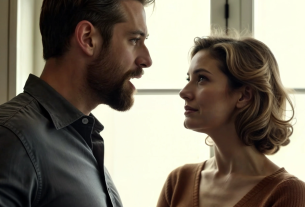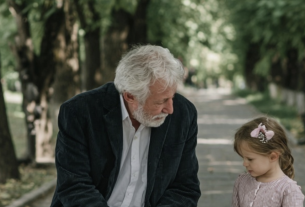— “Olya, we need to go to Mom’s this weekend. She’s feeling bad again and asked for help,” Sergey’s voice, as he walked into the kitchen, was his usual carefree tone. He tossed his keys into the wicker basket on the shelf; the jingle of metal was as ordinary as the ticking of the wall clock, as the smell of fried chicken already beginning to fill their small apartment. It was part of the ritual, a harbinger of yet another weekend dedicated not to them, but to his mother.
Olga didn’t turn around. Her back was perfectly straight, and the hand holding the heavy chef’s knife moved with measured, almost hypnotic precision, turning a firm, juicy onion into a scatter of translucent cubes. That monotone rhythm, honed over years, was her form of meditation—the only sound in the world she could control. Everything else—plans, desires, time—had long since stopped belonging to her.
“No.” The short word fell onto the cutting board with the next portion of chopped onion. It sounded quiet, but carried the weight of a cast-iron weight dropped onto the glass tabletop of their family order.
Sergey froze halfway to the fridge, where he’d been headed for a cold bottle of water. He blinked, as if static had garbled the usual signal. In his world, where the trips to Darya Petrovna’s were as unshakable a part of the schedule as sunrise or the mortgage payment, that “no” was a system error—a blue screen of death for their well-oiled routine.
“What do you mean, no?” He stepped closer; his shadow covered Olga and the cutting board. There was no irritation in his voice, but a sincere, almost childlike bewilderment. “I don’t get it. Mom feels bad. She’s my mother, she’s sick, she needs help. What other options are there? This isn’t up for discussion.”
The knife stopped. For a moment the kitchen hung in a tense pause filled only with the hiss of oil in the pan. Then Olga, with slow, deliberate force, drove the knife tip straight into the center of the old wooden board. The blade sank a centimeter into the wood and stood upright, like a black obelisk on the grave of her boundless patience. She turned around slowly.
Her face was calm. Frighteningly calm. There was no anger, no old resentment he was used to seeing and had learned to handle so deftly—joking it away or changing the subject. There was only the cold, detached resolve of a surgeon before a complicated but necessary amputation.
“Sick?” she repeated so quietly that Sergey had to strain to hear. Her voice was even, without the slightest crack. “Let’s, as adults, recall her last ‘illness.’ Two weeks ago. Saturday. I went over because her ‘blood pressure shot up to two hundred and her back ached so badly she couldn’t straighten up.’ The first thing I did was wash the floors in her entire two-room apartment because, I quote, ‘it was hard for her to bend down for the broom.’ And while I was on my knees, with a rag in my hands, scrubbing her trampled linoleum in the hallway, she sat in the kitchen and loudly, with feeling—so I wouldn’t miss a word—told her friend, Aunt Valya, what a useless housekeeper I am, a clumsy daughter-in-law, and how unlucky you, her poor son, are to be stuck with me.”
She took a step toward him, and he involuntarily stepped back. Her eyes were dark and unreadable, like two pieces of obsidian. They reflected neither the lamp’s light nor his bewildered face.
“After that, her ‘bad back’ and ‘terrible pressure’ didn’t stop her from asking me to go to the market. Remember you called and wondered why I was taking so long? I’ll tell you why. Because I was lugging two five-kilo sacks of potatoes and a three-kilo head of cabbage. And she walked beside me empty-handed—she even gave me her purse to carry—lamenting that young people today are all so weak, not like their generation.”
Sergey opened his mouth to object, to slip in the usual, saving “well, Mom just talks, she doesn’t mean it,” but the words stuck in his throat. He looked at his wife and realized he wasn’t talking to the Olga he knew. That Olga would sigh, sulk, cry into her pillow—but in the end give in. This woman was looking at him as if she were administering a final exam on their shared life. And he was flunking it spectacularly.
“Your mother isn’t sick, Seryozha. She’s an energy vampire who feeds on my humiliation. She feels good when I feel bad. Her pressure normalizes when I feel worthless. Her back stops hurting when my will breaks. I’m not participating anymore. If you want to go—get in the car and go. Mop her floors. Carry her bags. Listen to her poison, which she’ll pour over me generously in your presence. But you won’t drag me there again. Ever.”
“But she’s waiting for you! And anyway—”
“I’m not going to keep going to your mother’s and helping her so she can fling mud at me in return! And I don’t care that she’s an old, sick woman! The only thing sick about her is her head!”
She said it evenly, without a single trembling note. It wasn’t an ultimatum. It was a statement of fact—dry and hard as granite. She turned away, just as slowly as she’d turned to him, yanked the knife from the board, and with the same methodical calm went back to slicing carrots. And Sergey stood in the middle of the kitchen, stunned not by a shout but by the lethal quiet of her voice, and with chilling clarity realized that the door he’d been habitually, insistently knocking on every weekend had just slammed shut in his face. And someone had hung an invisible sign on it: “No entry.” Forever.
Sergey stood in the kitchen like a man who’d just been told the earth is actually flat. The air that a minute ago had smelled of hominess and fried chicken now felt thick and heavy. He stared at his wife’s unyielding back, at her hand mechanically mincing the carrot, and his initial confusion quickly curdled into a boiling, familiar irritation. He didn’t know how and didn’t want to understand her motives; he only knew how to force his will through.
“So that’s it?” He took a step forward, invading her space by the stove. “You just decided? For the two of us? You’re just crossing my mother out of our life because she, excuse me, has a difficult personality? All old people are difficult! She needs to be understood, pitied! She’s lived a life; she loves us the way she can!”
Olga didn’t turn. She swept the chopped carrot into the pan; the vegetables hissed in protest at the hot oil. That sound was louder and more honest than her husband’s words.
“I didn’t decide for the two of us, Sergey. I decided for myself. That’s my decision. You can pity her, understand her, and love her as much as you like. That’s your right and your duty. I consider my duty of listening to insults and fulfilling demeaning requests fulfilled. With interest.”
Her calm infuriated him far more than shouting. You can argue with a shout; you can out-shout it. But that icy, reasonable tone disarmed him, making Sergey look flighty and in the wrong. Which only angered him more.
“You’re just selfish!” he spat, raising his voice. “You’re incapable of an ounce of compassion! You only think about your comfort! My mother is sick, and you’re going on about some humiliations! You’re just too lazy to haul your butt over there and help an old person!”
He expected her to explode, to start the usual squabble where he excelled. But Olga only turned off the burner, took a kitchen towel, and slowly, carefully dried her hands. Then she faced him.
“Yes, Sergey. You’re absolutely right. I’m selfish. I want to spend my only two days off a week in comfort and peace, not as a free maid and a punching bag. If caring about my own dignity is selfishness, then I’m the biggest selfish person in the world. And now, if you don’t mind, I’m going to take a shower.”
She walked past him without touching him and left the kitchen. He was left alone amid the smells of food he no longer wanted. He’d been defeated. Utterly. And, as always in such cases, he did the only thing he knew how to do—he pulled out his phone and dialed the number that was both the source and solution of all his problems.
Olga’s phone, lying on the nightstand in the bedroom, rang ten minutes later. She had just come out of the bathroom, wrapped in a terry robe. “Darya Petrovna” lit up on the screen. Olga drew a deep breath, exhaled, and swiped to answer.
“Olechka? Sweetie, it’s me…” The voice on the other end was weak, creaky like an unoiled gate, and full of suffering. It was Darya Petrovna’s signature voice for special occasions. “Seryozhenka called and said you won’t be coming… Did I do something wrong, dear? Are you offended at an old woman?”
“Hello, Darya Petrovna,” Olga’s tone was polite and absolutely neutral. The formal “vy” was the first shot in this battle. “Sergey told you correctly. I won’t be coming.”
“But… why, dear?” The mother-in-law’s voice took on notes of cosmic sorrow. “My heart seized up today, my pressure’s jumping… I thought you’d come help me wash the windows—I can’t do it myself anymore, I can’t raise my arms…”
“If you have heart and blood pressure problems, you should be lying down and calling a doctor, not washing windows,” Olga parried with the same cold politeness. “You need rest. I won’t tire you out with my presence.”
There was a few seconds of silence on the line. The plan was misfiring.
“Seryozhenka is so upset,” Darya Petrovna tried a new approach, coming in from the son side. “He says you don’t pity him at all. He’s my only one—I pin all my hopes on him… and on you.”
“Anything regarding Sergey’s distress is best discussed with him directly, Darya Petrovna. That’s between you and him.”
The mask began to crack. The frailty in the mother-in-law’s voice shifted into poorly concealed irritation.
“I see you’ve decided you’re the queen of our family,” she hissed, no longer trying to play the invalid. “Listen to that voice of yours… steel. I don’t recognize my modest Olechka.”
“Perhaps,” Olga agreed calmly. “I’m sorry, Darya Petrovna, my dinner is getting cold. All the best to you. Do take care of yourself.”
She hit “end” without waiting for a reply. She stood in the middle of the room; her heart hammered from the adrenaline dump, but her hands didn’t shake. She had won this round. But she knew her mother-in-law well. Darya Petrovna wasn’t the type to retreat. She was the type who, after a failed probing attack, begins an artillery barrage. And Olga knew the next shell would land very close. Right on her doorstep.
Saturday morning brought no relief. It brought with it a thick, viscous silence that filled the apartment, making the air dense and hard to breathe. They had breakfast in silence. Sergey spread butter on bread with aggression; his movements were sharp, full of unspoken reproach. Olga calmly drank her coffee, looking out at the gray cityscape. She didn’t feel like a victor—more like someone who had crossed the Rubicon and now stood on enemy shores, awaiting the inevitable attack. She knew the phone call was only the prelude. The main act was ahead.
They spent the morning in different rooms, like two strangers thrown together by fate into one apartment. Sergey ostentatiously watched TV loudly in the living room, flipping channels with aggressive speed. Olga sorted through the closet in the bedroom, methodically and mercilessly getting rid of old things. The activity soothed her, gave her the illusion of control. Every blouse thrown out, every pair of worn-down shoes was a small act of liberation.
Around noon, the doorbell rang. Not sharp and demanding like a courier’s, but short, almost bashful—yet insistent. Double ring. Pause. Then double again.
Sergey turned off the TV. In the silence that followed, they looked at each other. In his eyes was confusion and a faint hope it was a mistake. In Olga’s there was nothing but cold knowledge. She recognized the handwriting. It was her.
Sergey went to open the door. Olga stayed by the closet, holding a neatly folded stack of sweaters. She heard the lock click, the door creak. And then Sergey’s strangled, uneven intake of breath.
“Mom? What happened?”
On the threshold, artfully leaning against the doorframe, stood Darya Petrovna. One hand was pressed to her heart; the other hung limply at her side. Her face was pale—but not sickly gray—stage-chalk white, like a silent-film actress. Her eyes were half-closed, and an expertly simulated sheen of sweat glistened on her brow.
“Seryozhenka… son…” she whispered, stepping inside and sinking into her son’s arms, which instantly caught her. “Forgive me, I didn’t mean… I was on my way to the pharmacy, it’s near here… and suddenly everything went dark, my head started spinning… I thought I’d make it to your place, at least sit on the steps… and there you were…”
Swept up in panic and filial love, Sergey practically carried her into the living room and settled her gently into the biggest, most comfortable armchair. He fussed around her like an alarmed sparrow.
“Mom, I’ll get some water! Or Corvalol? Check your blood pressure? Olya!” he called, and open reproach rang in his voice. “Bring the blood pressure monitor! Hurry!”
Olga walked in. She set the sweaters on the dresser and watched the scene unfold. She didn’t see a sick woman. She saw a brilliant performance, polished over years. She went to the medicine cabinet, calmly took out the monitor, and handed it to Sergey.
“Here you go.”
Darya Petrovna cracked her eyes open and looked at her daughter-in-law. The gaze that a second ago brimmed with suffering was now sharp and appraising.
“Olechka… hello… I’m sorry to drop in like this… without warning,” her voice was still weak, but metallic notes slipped in. “I didn’t want to burden you. I know you get tired; you don’t want to see me…”
A precise, measured strike aimed straight at Sergey. And it landed. As he fitted the cuff on his mother’s arm, he shot Olga a look full of indignation.
“Please, stop it, Mom. Of course we want to see you. Always. It’s just… not everyone understands that.”
Olga ignored the jab. She stepped to the other side of the armchair.
“Shall I bring you some water, Darya Petrovna? Warm or cold? Perhaps mint tea? They say it soothes.”
Her impeccable, icy politeness was the best defense. It offered no grounds for accusation, yet demonstrated complete detachment. She wasn’t part of the production; she was a front-row spectator.
Sensing this, Darya Petrovna changed tactics.
“Thank you, dear, no…” she weakly waved a hand. “The best help is a kind word. Just look at my Seryozhenka… so caring. He pours his whole soul into me. He can see how bad I feel.”
She paused, letting the poison soak in.
“It’s so clean here, Olya. Cozy. You can tell the hostess has lots of free time. Not like me, a decrepit old wreck. My hands aren’t what they used to be to keep order.”
A direct shot—a reproach wrapped as a compliment. Sergey frowned even more. Olga only smiled slightly.
“We try to keep things clean. It’s discipline.”
She stood straight and calm, and her composure infuriated both her husband and her mother-in-law. They wanted a reaction: a breakdown, excuses, tears. But she simply stood and watched them flounder in the web of lies spun by Darya Petrovna. And that web, so familiar and reliable, for some reason no longer worked. It tore on the cold, sharp edges of Olga’s calm. The atmosphere in the room thickened to the limit. The incursion had taken place. The siege had begun.
Sergey removed the cuff from his mother’s arm. He looked in puzzlement at the monitor display, then back at his mother. The numbers on the little screen were immaculate: one hundred twenty-two over eighty. An astronaut’s pressure. He was silent, and that silence spoke louder than words. Realizing her trump card had been beaten, Darya Petrovna advanced from another, time-tested direction.
“It’s not my pressure, son… it’s my nerves. My soul hurts,” she sighed heavily, and her gaze, full of universal sorrow, fixed on Olga. “When you see that your only son is living… not the way he could. That the woman beside him is cold, without a drop of warmth. I’ve done everything for you, everything for family… I dreamed of grandchildren, so I could bake pies and tell stories. And in the end—emptiness. A beautiful home with no life in it.”
A low blow, delivered with the mastery of a seasoned fighter. She knew the topic of children was the sorest spot for Olga. And she struck there, in front of her son, casting Olga as the culprit of all misfortunes.
That was the last straw. Not for Olga. For Sergey. He sprang up, his face contorted with righteous anger. He didn’t see manipulation—he saw his mother’s suffering, which in his mind was caused by his wife’s callousness.
“Do you hear that?” He stepped toward Olga; his voice broke into a shout. “Do you hear what you’ve driven her to?! Do you have a conscience? Anything human left in you at all? My mother is practically at death’s door, and you just stand there like a statue!”
And at that moment, Olga stopped being a spectator. She slowly raised her head and looked not at her husband, but straight into her mother-in-law’s eyes. Her face was expressionless, but deep in her eyes a cold, white fire lit.
“Enough,” she said. The word was quiet, but it silenced both Sergey and Darya Petrovna. Olga took a step forward, into the center of the room—onto a sunlit patch of parquet that suddenly felt like a stage. And she was the leading actress on it.
“Let me remind you, ‘sick woman,’ of your love and care,” she began, switching to the familiar “ty” with lethal calm. Her voice did not tremble; it rang like a taut string. “Remember my birthday three years ago? You gave me an expensive perfume, and then, when I went into the kitchen, you told your friends that I’d begged you for it because ‘people from her pauper village can’t afford that.’ I heard every word.”
Darya Petrovna jerked as if slapped. The pained mask on her face began to slip, revealing hard, spiteful features.
“Remember when I baked your signature apple pie for the family dinner?” Olga continued, not giving her a chance to speak. “And you announced in front of the guests that I’d stolen the recipe from you and ruined everything with my ‘clumsy hands.’ Then, when everyone left, you happily ate two slices.”
Sergey stood gaping, looking from his wife to his mother. He’d heard fragments of these stories but always chalked them up to “women’s nonsense” and “Mom’s character.” Now, spoken in that icy tone, they formed an ugly, irrefutable picture.
“And now the main thing,” Olga took another step toward the armchair. “About your illness and my heartlessness—”
“Oh, really? And what have you made up now?” the older woman cut in.
“I’m not going to keep coming to you and helping so you can smear me with filth in return! And I don’t care that you’re old and sick! The only thing sick about you is your head! I told Sergey that yesterday, and now I’m saying it to your face. Every trip to you is a carefully planned session of humiliation. You make me wash the floors while you discuss my ‘worthlessness’ on the phone. You send me to lug heavy bags from the market, complaining about your back that miraculously heals the moment I step over your threshold.”
She stopped right in front of the armchair, looking down at her mother-in-law.
“You’re not ill. You’re an actress. A very bad actress whose repertoire I’ve memorized by heart over ten years. Your only real disease is malice and envy. You need someone to be miserable so you can feel alive.”
Finally, she turned to her husband. Her gaze held not anger but something far worse—icy contempt.
“And you, Seryozha… you saw all of this. You heard all of it. All these years. And you always chose silence. You weren’t blind—you were an accomplice. The perfect son for the perfect mother. Enjoy each other’s company.”
At that moment, the mask fell off Darya Petrovna completely. Before them sat not a frail old lady but a woman full of rage and humiliation. Her face flushed purple; her eyes shot sparks.
“You little—” she hissed, then stopped short, realizing that any words would only confirm Olga’s rightness.
Crushed and undone, Sergey looked at his mother’s hatred-twisted face, then at his wife’s cold, unfamiliar one. His world—so simple and clear—collapsed in three minutes. He made his choice. The only one he could make.
“Get dressed, Mom,” he said dully, not looking at Olga. “We’re leaving.”
Olga said nothing. She turned silently and walked to the kitchen. She didn’t watch Sergey helping his mother up, or the way both of them, as if by agreement, avoided looking in her direction, or how they hurriedly got ready in the hallway. She went to the sink and turned on the cold water. The loud, even rush drowned out the sound of the front door opening and closing—severing her past for good. The performance was over. And all the roles had been played to the end.



